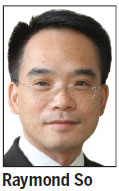Hong Kong needs a third runway
Updated: 2014-06-26 06:56
By Raymond So(HK Edition)
|
|||||||||
Last week the Airport Authority (AA) announced the results of the Environmental Impact Assessment (EIA) report on the proposed third runway. According to the report, assessments have been performed in 12 areas covering the impact on air and noise pollution as well as upon Chinese white dolphins and fish. Needless to say, the construction of such infrastructure would affect the natural environment. The third runway is no exception.
The key is that the EIA report discusses remedial measures to minimize any negative impact on the environment. In general, the report is positive on construction of the third runway. If one looks into the EIA report in depth, it is evident that our society is keen to protect the environment. So naturally, economic development cannot be overemphasized at the expense of the environment.
However, it is also true that Hong Kong greatly needs the third runway to facilitate economic development. According to figures released by the AA, it is projected that the Hong Kong International Airport's (HKIA) capacity will reach saturation point in 2019. But strong growth in air traffic in recent years means it could reach this point even earlier. Revised estimates suggest that capacity may be saturated as early as 2016. There is already considerable pressure on capacity at the airport, so we need to expand it to cater for growing demand.

Furthermore, with Hong Kong's successful transformation into a service-based economy - with currently 92 percent of GDP derived from service industries - an efficient airport is vital as the principle point of connection both for people going overseas and for overseas visitors coming to Hong Kong. This is of particular importance to the finance industry. The industry is catering to high-end clients and professionals who need to fly to Hong Kong on business. The lack of an efficient airport inhibits development of the financial services sector, for this reason HKIA needs an upgrade - a third runway would be an important step in the right direction.
In terms of services, HKIA ranks high internationally, which means it is well suited to its role as a regional aviation hub. Its excellent standard of aviation services has brought many other businesses to the territory. From a social perspective, this generates many employment opportunities for the city. Recently, HKIA created nearly 80,000 jobs at many different levels from highly skilled to lower-level positions, benefiting many people. This was also very beneficial for the working population of Tung Chung. It also means Tung Chung residents do not need to travel long distances to work in the city.
Aside from the economic advantages, the third runway can also help consolidate Hong Kong's position as an aviation hub. In the nearby Pearl River Delta, there are five international airports: Hong Kong, Shenzhen, Guangzhou, Zhuhai and Macao. There is already stiff competition among these five international airports. If Hong Kong does not continue to excel in providing world-class aviation services, it could lose its leading edge as a premier aviation hub.
Those who visit airports in Guangzhou and Shenzhen will naturally take note of the facilities and services there and compare them with Hong Kong. In terms of aviation charges HKIA is more expensive, but the SAR retains its competitive edge because of its high quality of service. However, we cannot just rely solely upon our soft services. We need to ensure we constantly upgrade our infrastructure. If our airport lacks the appropriate hardware, some flights will not come here. They will move to nearby airports instead. Once we lose them, we will lose them forever. The third runway is the best way to deal with this tough competition. It can provide us with much needed capacity to ensure we remain competitive in future.
Another important reason for adding capacity to HKIA is it will create room for the entry of low-cost carriers (LCC). LCC have helped travelers and the logistics sector reduce costs. This will further boost tourism and the logistics sector. Hong Kong actually lags behind other leading aviation hubs in the development of LCC. A major reason for this is that there is not enough space for more airline companies. A third runway will provide extra capacity for LCC and bring benefits to travelers and the logistics industry.
Construction of a third runway will boost economic development. We all know this will also affect the environment. The Airport Authority's EIA report makes this clear. So we need to strike a balance between environmental protection and economic development. But we should not adopt a "do nothing" approach just for the sake of the environment. Equally, we should not over-emphasize the economic benefits to the detriment of the environment. The key is to undertake sustainable economic development.
The author is dean of the School of Business at Hang Seng Management College.
(HK Edition 06/26/2014 page9)